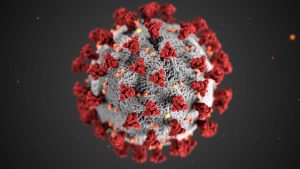COVID-19 variant NB.1.8.1:

One case of the newly emerging COVID-19 variant NB.1.8.1 and four instances of the LF.7 type have been detected in India, according to Indian SARS-CoV-2 Genomics Consortium (INSACOG) data.
- INSACOG was established by the Government of India in December 2020.
- It was jointly initiated by the Union Ministry of Health, and the Department of Biotechnology (DBT) with the Council for Scientific & Industrial Research (CSIR) and the Indian Council of Medical Research (ICMR).
- It is a consortium of 54 laboratories to monitor the genomic variations in the SARS-CoV-2 by a sentinel sequencing effort which is facilitated by the National Centre for Disease Control (NCDC), Delhi, involving the Central Surveillance Unit (CSU) under the Integrated Disease Surveillance Programme (IDSP).
- The mandate of INSACOG has evolved with time, and the focus has shifted from primarily tracking variants among international passengers to early detection of variants that may emerge within the country.
- It has the following objectives:
- Early detection of genomic variants of public health implication through sentinel surveillance.
- To determine the genomic variants in unusual events/trends (vaccine breakthroughs, superspreader events, high mortality/morbidity trend areas, etc.)
- To correlate the genome surveillance data with epidemiological data.
- To suggest public health actions based on the analysis of genomic and epidemiological surveillance data.
- The data from the genome sequencing laboratories is being analysed as per the field data trends to study the linkages, if any, between the genomic variants and epidemiological trends.
- This helps to understand superspreader events and outbreaks and strengthen public health interventions across the country to help in breaking the chains of transmission.




